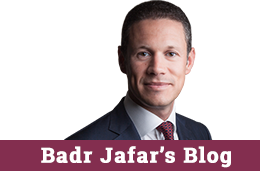Break Stereotypes and Mentor The Next Generation
Apart from being recognized as a successful businessman in the UAE, you have shown to have a great passion to dedicating yourself to initiatives with a strong social component. What are some of your social and philanthropic projects most dear to your heart?
I am a strong believer that one of the greatest tools at our disposal today to address some of the most pressing socio-economic challenges of our time is social entrepreneurship. As such, Crescent Enterprises has adopted a strong spirit of social responsibility throughout its operations. We have developed strategic partnerships with several social initiatives, including spearheading the launch of a dedicated regional programme with Ashoka, a global platform for social innovation, earlier this year.
My belief in the business case for good corporate governance led me to co-found the Pearl Initiative, a venture between the private sector of the Gulf Region and the United Nations Office for Partnerships, to promote a corporate culture of transparency and accountability. The Pearl Initiative is a growing network of the businesses from within the Gulf Region that have come together to drive a shared belief that strong corporate governance benefits both their organisations’ and the wider economy as we strive to create the tens of millions of jobs we need to over the next decade or so.
The development of arts and culture in the Middle East is another key area of focus for Crescent Enterprises and for me personally, as I am an advocate of the power of the cultural economy as well as building cultural bridges from our region to the rest of the world. This was the basic logic behind the establishment of the Global Gumbo Group (G3), in partnership with legendary producer and my dear friend Quincy Jones whom I had the honour of meeting when I was 19. Our first project involved teaming up with 24 of the MENA region’s top artists to produce and release ‘Tomorrow-Bokra’, a charity anthem to serve as a beacon of solidarity and hope for the youth of the Arab region. The song, which was released in November 2011, debuted at number one on the charts and went on to become one of the fastest selling Arab songs of all time.
The song also raised money for disadvantaged children’s arts education across the Middle East, and demonstrated the way in which art can transcend politics and enrich lives. This month at the Dubai Film Festival, we premiered ‘Bokra The Film’ – a feature length documentary showcasing the evolution of the project and the broader impact of the arts on the lives of our children, which I hope will inspire many others to support the role of the arts in the development of our youth.
Another example of a philanthropic initiative in the arts is the Middle East Theatre Academy (META). META is the first of its kind academy designed to introduce, influence, and nurture the youth of the region in the art of theatre, stage performance and related education. Our first academy takes place between the 10th and 26th of January in the Emirate of Sharjah, and will involve 35 youths from 11 countries across the region, the culmination of which will be a locally produced theatrical production performed publically on the evening of the 25th and hopefully go on tour shortly afterwards.
The Crescent Group has been one of the UAE’s success stories. Heavily involved in oil and gas the group has now diversified into various fields. What does the future hold for the Crescent Group for the years to come? Which of your businesses will represent the biggest share of growth going forward?
The Crescent Group was established 43 years ago in the UAE, and is today one of the most progressive family businesses in the region. The origins of the business are rooted in oil and gas sector with Crescent Petroleum, the energy arm of the Group. Over the years, and alongside the diversification of the UAE itself, we have successfully diversified into a variety of industries and markets, culminating in the creation of Crescent Enterprises, which actively develops and expands all other assets, investments and operating companies within the Group. Today, Crescent Enterprises has a portfolio of 20 companies employing over 6,000 men and women, extending across six core sectors including: ports and logistics, power and engineering, business aviation, healthcare, media and entertainment, and private equity.
The guiding ethos of Crescent Enterprises is to provide for the long-term, providing management expertise as well as investment to build and grow our companies as sustainable enterprises. The value we bring to our ports and logistics subsidiary, Gulftainer, has resulted in it recording a 14 per cent year-on-year increase during the first six months of the year at its container terminals, and in June this year securing a 35-year concession to manage Port Canaveral’s container and cargo terminal in Florida, marking the first ever successful expansion of a ports company from our region into the USA. This wouldn’t have been possible without the extremely close working relationship between Gulftainer’s management and the Crescent Enterprises team.
Given that global infrastructure spending is expected to double by 2025 to more than $9 trillion looking ahead we foresee that our infrastructure-related businesses are well positioned to drive growth for the Group.
We are also exploring new sectors that we feel are currently underserved in emerging markets such as consumer-centric businesses where demand is growing. A recent McKinsey report estimated that the consuming class in emerging markets will reach 4.2 billion people by 2025 and its consumption will account for $30 trillion, nearly half of the global total.
With this in mind, we recently launched CE Ventures, which aims to transform ideas into viable businesses that generate a broad positive social impact. As an internal incubator for start-ups spanning a wide range of sectors and industries, it will create companies and assist them through each phase of development. CE Ventures has several companies in the development phase in the energy efficiency, cultural economy, and e-commerce spaces as well as the incubation of an industrial clothing business. Watch this space.
The UAE has been home to your family business for decades. How do you see the way the UAE is developing into the future. What would you say are some of the challenges and opportunities that the UAE will be facing.
I am a proud Emirati with both Iraqi and Palestinian heritage, born and raised in a country that serves as a shining example to the rest of the region amidst the turmoil. The UAE has developed a safe haven status that continues to attract foreign investment and encourages a spirit of entrepreneurialism and innovation. In December 2014, the UAE celebrated its 43rd National Day, which for many living in the country – including myself – prompted a nostalgic look back to the last four decades and the incredibly inspiring achievements it has made. Despite being a young country, the UAE has achieved some of the fastest growth rates in the world, with GDP rising from $1.8bn in 1971 to an expected $381.2bn in 2014. Today, it has a thriving non-oil driven economy and is a superb example of how a country can wisely use both natural resources and investment in greenfield sectors, such as banking, aviation and ports and logistics, to generate sustainable long-term prosperity for its nationals and residents alike.
The UAE has a wealth of opportunities ahead as we continue to develop and diversify our economy. There is a huge amount of potential for regional companies to export home-grown goods and services, which I believe we need to see more of. Through Gulftainer’s concession deal in Port Canaveral, for example, it is passing on its decades of home-grown experience to grow and develop other parts of the world.
One of its biggest challenges looking ahead, in my opinion, will be the localisation of the Private Sector in terms of encouraging UAE nationals to look at careers outside of the safety net of government sector jobs. Having our nationals playing a very direct and impactful role in the growth of our Private Sector is key to the development of a sustainable economy.
For the purpose of our publication, LEADERS Middle East: What is the role that leadership plays in all spheres of society in this country, from business to the political landscape?
Leaders across the region, in both business and politics, have the potential to play a fundamental role as role models for the region’s vast youth population through establishing best practice. I believe all successful leaders across the world have several common traits; they inspire, are able to manage resources in a sustainable manner and, most importantly, they generate high levels of trust. As the corporate world continues its path to economic recovery and the rise of social media calls for greater transparency and accountability, establishing trust amongst all stakeholders has never been more important.
Mentorship is also crucial to the development of new ideas, social development and entrepreneurial ventures, which in turn leads to the creation of much-needed jobs and the development of the local economy. Regional research recently conducted by Ernst & Young suggests that 88 percent of entrepreneurs who have mentors and the right support systems have been successful in establishing their businesses.
It is imperative that leaders across the Middle East share their stories of success in order to contribute towards the development of our young women and men. I would encourage leaders from all aspects of business to look at ways in which they can help inspire and mentor the next generation of business leaders, whether it is through structured mentor programmes or their own company-led initiatives.
You have been recognized by the World Economic Forum as a Young Global Leader. How important is it for this nation, or for that matter any nation, to develop young global leaders? How serious is the UAE about youth development?
The Middle East is experiencing an unprecedented youth bulge. With over 30 percent of its population between the ages of 15 and 29, representing over 100 million youth, this is the highest proportion of youth to adults in the region’s history. The result of this rapidly growing population is that youth unemployment is at its highest with over one-third of young people out of productive work.
The only way to tackle unemployment in the long run is through the development of entrepreneurship and the creation of more SMEs, which as we know in all developed economies are responsible for the vast majority of job creation. We must all therefore encourage our youth to develop the skills needed to start new businesses, and for this to happen we need to continue to develop and support a cohesive ecosystem that provides appropriate education, access to capital, regulatory environment, builds advocacy and mentorship programmes for this to flourish without hindrance.
There are many examples of very young business leaders across the world breaking stereotypes and establishing global businesses that positively disrupt our world – just look at the example set by young people like Facebook’s Mark Zuckerberg and Twitter’s Jack Dorsey. In the Middle East, there are many similar success stories on a regional scale but they are not celebrated enough in the same way. The region needs to break traditional hierchial structures and realise the full potential of its youth.
The UAE has therefore put the development of its youth at the forefront of its economic development and is actively nurturing its talent to become our global business leaders of tomorrow. In addition, and very importantly, the country is leading the way in the region by actively working to increase female participation within management and at boardroom level. In December 2012, the Government of the UAE made it compulsory for companies and government entities to appoint women on to their boards of directors, with Sheikh Mohammed bin Rashid Al Maktoum, Vice President of the UAE and Ruler of Dubai, tweeting his ambition for women to have “a strong presence in decision-making positions in our institutions”. Other examples include the Youth Parliament in Sharjah, established by His Highness Sheikh Sultan bin Mohammad Al Qasimi, Ruler of Sharjah, which has been active for decades now, and which encourages youth to have their say on issues affecting them while instilling a sense of community and responsibility.
What does it take to become recognised as one of the UAE’s successful business leaders? What is the secret you can share with would-be young leaders?
Our country and wider region is home for a wealth of talent and it is always inspiring to see entrepreneurs and business leaders achieve success on both a local and international scale. I think it is important to highlight and promote these stories within the community to encourage other young leaders to develop their own paths and take the necessary risks without fear of the consequences of failure. For this to happen, it is also important that successful leaders talk about their failures, which is nothing to be ashamed of and which we have all experienced. Fear of failure and a lack of self-confidence, in my opinion, is one of the biggest factors stopping many youths in our region from pursuing careers on their own. Although a lot of people don’t deal with failure very well, in most cases it is learning from failure that pushes one to strive to becoming successful and that it is a critical part of the entrepreneurial process.
One of the biggest lessons I have learned during my career path is that you should always strive for a deep sense of purpose in all endeavours. I also believe it is important for us all to continue to challenge ourselves, constantly questioning why we are doing what we are doing in a selfless manner, and strive to be the best that we can by seeing your greatest role model as being yourself in 10 years. This way, always working on being a better you!
As featured on Leaders Middle East on 23rd December 2014.

 Tweets by @BadrJafar
Tweets by @BadrJafar









